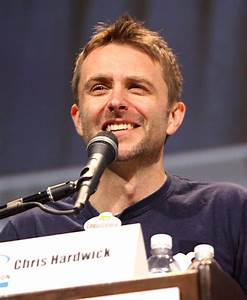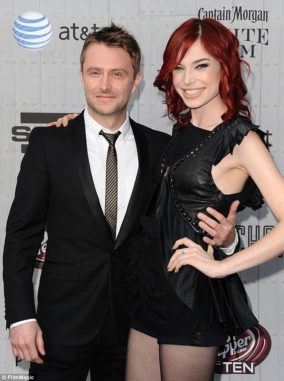I don’t much like Chris Hardwick. He may be the current face of all things nerdy, but I say he comes off as insincere, with his seemingly carefree persona and ever-present grin both looking as fake to these eyes as the proverbial three dollar bill. Yet his current troubles I find equally questionable, and quite telling of true nature of today’s Nerd Culture. In short, Hardwick’s rise and fall represent Nerd-dom at its worst.
Unless you’ve been living off the planet for the past two weeks you’re probably aware of the allegations that have been lobbed at Hardwick. The accuser was Hardwick’s actress ex-girlfriend Chloe Dykstra, who claimed in a Medium published essay that during the course of a three year courtship a certain well-known media figure emotionally and sexually abused her in all manner of ways and, after she dumped him, blacklisted her from the industry. The abuser goes unnamed, but it was immediately obvious to me, and apparently everyone else, exactly who Dykstra was referring to.
Chris Hardwick’s unlikely ascension occurred after years of struggle as an actor, radio DJ and TV host. His breakthrough came with the Nerdist podcast in 2010, and the formation of Nerdist Industries the following year, which led to copious voice-over work and hosting gigs for AMC, Comedy Central, Comic-Con and NBC. Hardwick’s appeal was summed up by an internet commentator thusly: “If anyone was going to be like “comic books are cool now and you should all follow me,” it was going to be the conventionally good-looking white man.”
There have been justifiable complaints about Hardwick’s domination of the nerd-scape. Film Threat’s Chris Gore compared him to Donald Trump in the way Hardwick “took over geek culture the way Donald Trump took over the Republican Party. And the world will be a much better place when both are gone,” while Pajiba’s Joanna Robinson, reflecting the sentiments of many a nerd (this one included), made a similar point by asking “Who the Hell elected Chris Hardwick as the voice of my generation?”
In fairness, Hardwick’s “King of the Nerds” status wasn’t entirely his own doing. Think back to twenty years ago, when Harry Knowles of Aint-it-Cool-News was given the same title by media titans who labored under the belief that Knowles was far more influential than he actually was. Hardwick may not be as obnoxious as the notoriously self-infatuated Knowles (who plastered his site with animated gifs of himself and insisted on recounting his dorky personal mythology to anyone who would—or wouldn’t—listen) but his situation is quite similar, having been ordained by the media, with the culture he supposedly represents having little say. Attempts have been made to snatch the title away from Hardwick by certain would-be nerd gurus (Will Wheaton, anyone?), but nobody has succeeded in unseating him—until now.
Certainly Chloe Dykstra deserves credit for finally knocking Chris Hardwick from his perch, but is her account trustworthy? I have my doubts.
Dykstra’s claim that Chris Hardwick is a controlling asshole isn’t at all difficult to believe—as previously stated, I’ve never bought into his affable nerd persona–but her self-portrayal in the essay frankly is. I found the essay on the whole to be quite calculated, from the opening disclaimer (“Trigger warning: If abuse, sexual assault or anorexia makes you uncomfortable, you might want to avoid this one”) to the many passages presented in bold-face (“No one could save me but myself,” “My fear of his anger at me for getting pregnant was literally greater than my fear of death”), which bely Dykstra’s presentation of herself as a naïve innocent. Correction: a saintly naive innocent, who claims upfront that “I’m here to tell my story, not necessarily intending to point my finger at the man who did it” (only to spend the remainder of the essay doing just that). She’s also careful to keep her future employment opportunities open by praising the “lovely folks” employed by her ex, who apparently made sure she was compensated for appearing on his podcast even after she declined payment.
Whatever Chloe Dykstra’s true motives for writing the essay, it appears to have worked out well for her. Within days of its appearance she went from being a nobody to a household name and, more importantly, Hardwick began losing jobs. In what has become an increasingly common occurrence in the Me Too era, Hardwick’s employers—AMC, NBC, Comic-Con—impulsively cut ties with him, and the Nerdist website deleted all mention of his name, corroborating evidence be damned.
Echoes of this action can be seen in the cases of LA’s late Cinefamily, a revival theater that was abruptly shuttered last August when its founder Hadrian Belove was hit with sexual harassment allegations, and the aforementioned Harry Knowles, who was booted from the Austin Film Critics Association and the Alamo Drafthouse in September after similar allegations were directed at him. In both cases the alleged perpetrators vehemently denied the allegations (and continue to do so), as has Hardwick, which appears to have had little effect on their collective fate.
Perhaps most surprising of all in Hardwick’s case was the reaction of the nerd community. Far from rallying around their fallen comrade, Hardwick’s “friends” have behaved like (to use another cliché) rats on a sinking ship. Some have even offered “proof” of Dykstra’s assertions in the form of personal anecdotes about Hardwick, i.e. a tweet about how he was once standoffish at dinner and an anonymous “producer’s” claim that “If you’re in the room talking to him, you could have a great conversation, but if someone walks in with a higher Q rating, he’s going to stop talking to you, not apologize and walk over to that person.” Typical Hollywood asshole behavior, in short, which does not make him a sexual abuser. Perhaps such ire is inevitable given the circumstances of Hardwick’s rise, but baseless accusations are wrong in any context.
It seems, however, that the tide may be turning in Hardwick’s favor. His mother-in-law Patricia Hearst (who knows a thing or two about abuse) has come to his defense, labeling Dykstra a “Bunny Boiler” (a reference to Glenn Close’s character in FATAL ATTRACTION) and posting a 2013 video in which Dykstra proclaims her undying love for Hardwick. That doesn’t invalidate Dykstra’s abuse claims, but it does suggest (to me at least) that there may be more to this account than she, or her defenders, are insinuating. She may well be telling the truth, but, frankly, I’m going to need a bit more evidence than what has been put forth so far before grabbing my pitchfork and joining the lynch mob.



